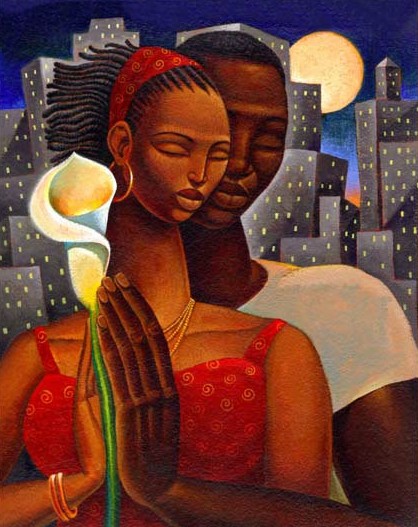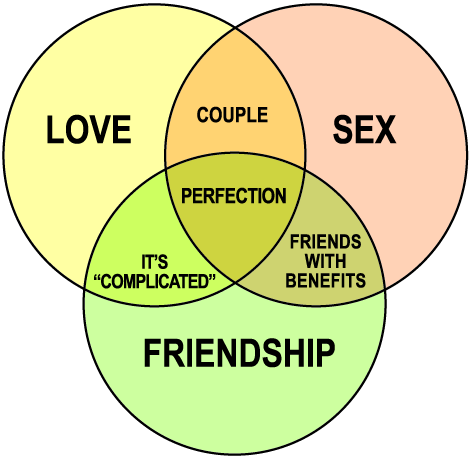
Are you satisfied with your love life? Do you spend your nights in the arms of someone you love? If not, why not?
Love is the most important thing in our lives, more important than happiness, health, wealth, fame or anything else.
Almost everybody agrees on its importance, from our greatest sages to the humblest folk proverbs. But we're not very
good at it, and most of our attempts end sadly. If it's so important, why are we so bad at it?
We're so bad at love that we've come to expect a high level of failure as completely normal. We make love, fall in
love, and even marry for love, and far more often than we'd like, our beloveds pass out of our lives within a few short
years - not to mention those we end up hating! With them go many shared memories, mutual friends, common interests, and
hard-won intimacy. Our love lives end up as a series of short, superficial relationships with people who will soon be
strangers again, and we are impoverished.
 There's a
simple explanation : we're doing it wrong! Most of the common beliefs about love - what it is, how to get it,
how to keep it - are relics from another era, as if we were trying to learn how to use an iPhone by reading the
instructions from a 19th century telephone. We shouldn't be surprised it doesn't work!
There's a
simple explanation : we're doing it wrong! Most of the common beliefs about love - what it is, how to get it,
how to keep it - are relics from another era, as if we were trying to learn how to use an iPhone by reading the
instructions from a 19th century telephone. We shouldn't be surprised it doesn't work!
So that's what this page is about. I'm going to explain where these bad old ideas come from and why they're bad, and
then I'm going to present the good new ideas you should replace them with. But before we start on that, I need
to warn you about a few traps you might fall into.

One trap is the very human flaw that we don't like to take responsibility for our failures - we like to blame them on
something else, preferably someone else. There's often an element of truth in our accusations, but that doesn't
matter : we don't control other people, we only control ourselves, so if our cake doesn't turn out right, it's not the
fault of the ingredients or the recipe, even if they are part of the problem. Our mission is to do the best we can with
what we have, not complain that we weren't given better material to work with.
Another trap arises when we confront disappointment. When we have expectations for something, we plan for it to turn
out that way. If it doesn't, which is often the case, we don't usually say "Hey, I had the wrong idea about this!". Instead, we often blame the reality for not living up to our expectations, even though that's crazy. The trick in
life is to recognize situations for what they are and act accordingly, not to lament that they don't conform to our
imaginations. That's especially true when our expectations are so out of date.
Using happiness as a guide is yet another trap. Of course we all want to be happy, but happiness in the short term
doesn't reliably lead to happiness in the long term. A person who comes home from work, plops down on the couch and
watches TV while eating potato chips will be happier in the short term than a person who goes running or biking for an
hour, but in the long term, being in shape will make you much happier.
In general, your feelings are a bad guide. What we feel as emotions are messages from our subconscious minds,
telling us what they want us to do. But those subconscious minds are just as stupid as our conscious minds, and their
outlook is very short-term, like children. I'm not advising you to ignore them : their very naivety makes them hard to
fool. Just don't take their advice without a grain of salt.
The most insidious trap is the idea that we get to decide what's important in life, important to success.
Wouldn't it be great to live in a world that worked that way? We could eat candy all day long, as long as we felt it
was important to our health. We wouldn't have to work, to study, to clean the house, or to do anything we didn't want
to do, as long as we could convince ourselves those things aren't important. Paradise! Unfortunately, the world we
live in isn't like that, at all. In this world, there's usually only one right way to accomplish something, and
we don't get to decide what it is.
Most of the secret of life - not just love, but all of life - is to recognize what's important and to focus on
it, ignoring all the other distractions that abound. It almost seems as if popular culture, the media and all our
friends are actively trying to steer us astray by calling our attention to some irrelevant detail. For example,
everybody agrees that beauty isn't very important, but look how much effort we put into it! It's often difficult to
discover what's important to success, so it's understandable that people disagree. But nobody gets to choose for
themselves; you aren't allowed to say "Well, that's important to me".
But what if you and your beloved agree on the importance of certain things, for example commitment, sexual
exclusivity, or how to raise children? Isn't it important to agree? Yes, but it's even more important to be
right! Believing something because you'd like it to be true is another trap. You may not like what I have to
say, and you may wish with all your heart that I was wrong, but if you want to succeed at love, it takes more than
wishful thinking; it takes courage : courage to think seriously about this, to confront our assumptions, and to change.
If you're not satisfied with your love life, and you want to break out of the pattern you're in - if you want longer,
deeper and better relationships - you have to accept that you and your outdated ideas are the problem, and you have
to change them. If you're not ready to do that, you can stop reading right here. Really.
Am I an expert on love? Do I have a Ph.D. in Romance or a fantastic 50-year marriage? No, I'm a grizzled veteran
who's lost most of his battles. But I don't have to be an expert to point out the obvious. And once you think about
it, my advice isn't controversial.
Many of you are going to purse your lips and say "Well, that's your opinion, but mine is different
(and just as valid)". Really? Are you sure that's your opinion, based on your own thinking and study? Or
are you just repeating what you've always been told, what you wish were true? Because if your opinion is
conventional, it's just plain wrong - that much is obvious.

Now I'm ready to discuss the biggest problem of all : the idea that we're supposed to be getting something back from
love, that love is a way to achieve some goal. There's a long list of things that we want in exchange for our "love" :
status, respect, self-esteem, reassurance, promises, commitment, fidelity, security, marriage, children and even
support. And of course we want to be loved in return!
Those are all Good Things; there's no shame in wanting them, or even in marrying someone who gives them to you.
That's what marriage is all about! But they have nothing to do with love, nothing at all! Fundamentally,
love isn't about what you get - it's about what you give.
If you read that last sentence alone, you'd probably agree with it without thinking. But very few people actually
act as if it were true. Would you love someone if they didn't make you feel good about yourself? If they weren't
faithful? If they didn't even love you back? Probably not.
But would you love your children even if they didn't make you feel good about yourself? Even if they loved someone
else? Even if they said they hated you? Of course you would! Because that's real love, unconditional love, and
we already do a pretty good job of it when it comes to our children and our pets : we love them selflessly. But
somehow, when it comes to our lovers, we forget what love is and get selfish again. And that's the problem.

I called the two kinds of love selfless and selfish, but those aren't the exact right words, because
even "selfless" love is selfish : we get something out of it.
As human beings, we're constantly trying to balance two opposing goals : to distinguish ourselves from
everyone else, and to merge ourselves with everyone else. The former is the search for identity, driven by
your ego, and the latter is the search for intimacy, driven by your heart.
Our ego is the part of us that looks after our self-interest, that cares what other people think, that's ambitious
. Those are all Good Things, in most circumstances, but they're incompatible with love. So we have to make sure we
keep them separate.
But if we don't get anything back, why would we ever love? The point of love isn't to help us get the things we want
in life, it's to help us forget our obsession with wanting and getting. For part of our lives, through the
miracle of love, we stop caring about ourselves and, instead, care about someone else. Try it and you'll understand!
Of course we can't love everybody - we have to choose who we love, and some choices are better than others.
We fall in love with people because of their qualities : they're attractive, they're sexy, they make you laugh or think,
or you just feel good in their arms. It's great if you get along very well and share many happy moments together - all
of those make life more pleasant. But that's not love, that's infatuation, and it doesn't last very long.
But it lasts long enough for lovers to become intimate, to drop the masks of our social identities and expose
ourselves to each other. And once two people are intimate, the qualities that made you choose to fall in love with
them aren't important any more. We don't love people because they deserve to be loved, and even less because we deserve
to love them. There's really only one reason to love someone : because we all need intimacy, and it doesn't really
matter with whom.
If you really love someone, you don't care what they do or what they look like, you don't care what other people
think, you don't even care what they think! You don't love them because they love you, or respect you, or make
you feel good about yourself. Because if you love someone for what you get back, it's only conditional love, and
you're just each other's clients in a mutually beneficial contractual relationship : a job.
If you really love someone, you don't care who they are : rich or poor, beautiful or ugly, nice or mean. Yes, you
can even love mean people! Because loving someone has nothing at all to do with who they are, and even less to do with
who you are. You are not defined by who you love : love is about intimacy, not identity.

So love is about intimacy, not identity? That sounds so obvious! How could anyone be confused about that?
Well, in fact, for most of history, women did base their identities on men, through the institution of
marriage (church, legal or neither). Marriage is a role, and it does define who we are, but it has
nothing to do with love. Here's a quick history lesson :
Back in prehistory, we lived in small tribes that shared everything, from food and shelter to sex to raising
children. Men hunted in bands of peers, and there were no marriages : women slept with most of the men in the tribe, as
do chimpanzees and bonobos, our closest relatives. How do we know this? Because this is the mating system to which
our bodies are adapted - our "natural" system.
With the invention of agriculture about ten thousand years ago, everything changed. Because clearing, plowing,
sowing, irrigating and protecting a crop is a huge investment of time, it only makes sense if you're going to reap the
harvest! So we invented property, and then we had to invent inheritance, and then we had to invent paternity, and then
we had to invent (female) fidelity, and so we invented marriage, in which women became another form of property, like
land, livestock and slaves.
With the Industrial Revolution two centuries ago, everything changed again. The workers in the factories, coal mines,
and steel mills weren't slaves, they were employees who freely chose to exchange their labor for money. And the role of
women also changed : they went from being property to being the junior party in a contractual relationship, like
employees. This marked the first time their consent was considered important, and so we invented the love
marriage, in which husband and wife are united by affection, not by duty. When people talk about traditional
relationships, this is what they mean. And these love marriages worked, more or less, for about two centuries.
But since the end of the Second World War, we have been passing into another era, one with many names - the Jet Age,
Atomic Age, Computer Age, Internet Age, Information Age, Digital Revolution, whatever - and everything has changed once
again. In fact, the pace of change has never been faster; we are not only different from our parents, but we ourselves
have to change over the course of our lives!
In this era, many people don't work for an employer ; they're consultants, contractors, or outsourced suppliers.
Those who are employees change jobs much more often (my father, like his father, spent his entire career at one
employer), or even change industries and do something completely different. Companies compete to attract the best
people, and bosses have to manage by persuasion, not by simply ordering people around as they used to. Obligation and
hierarchy don't play a role in this new world.
The projection of this onto marriage is called feminism : women aren't junior partners any more; they're
equals. The transformation is not yet complete, and the part that remains - changing our internal mindsets to match our
new roles - is far harder than what's already been accomplished. But the progress made to date is irreversible, and the
trend is clear. With luck, in another century or so, sexism, along with racism and homophobia, will seem quaint to us,
as we now regard the once-widespread prejudices between Roman Catholics and Protestants.
And the love marriage has completely fallen apart - traditional marriages just don't work any more. I could cite
statistics on divorce, on marital satisfaction, on children born out of wedlock and the many couples who don't even make
it to the altar. But you don't need all that; just look around you! Happy couples who love each other till death do
us part are a rare breed these days.

Why don't traditional marriages work any more?
Well, a love marriage is still a marriage, a commercial contract (and remember, we're talking about all
marriages, not just legal marriages or church marriages). And so even though the love may be heartfelt, it's still
dependent on the contract. The comedian George Carlin used to joke that when people tell him they love their jobs, he
asks whether they would still go to work if they weren't being paid. The analogy is apt.
Most couples falter because the parties come to resent the contract : they would like to be able to change the terms,
and/or they just don't like being obligated to do anything. Making a promise, or agreeing to assume any
obligation, is a Bad Thing that we do, wisely, in order to receive some benefit. For example, we agree to pay rent or a
mortgage in order to have a home. In like manner, we make a commitment to a spouse in order to receive a benefit, for
example, their commitment in return. But in many cases, as time passes, the value to us of the benefit received
drops below the cost to us of the obligation assumed.
Then, whether or not the parties abide grudgingly by the contract, try to amend it by renegotiating, cheat on their
partners, or just break their contract outright, this resentment poisons the emotional side of the arrangement, too :
the partners "fall out of love". Falling out of love is an effect, not a cause, just as falling in love is often
the result of finding the partner you're looking for.
This situation is made worse by the inflexibility of traditional marriages, expressed by the words "normal" and
"should". People don't usually approach marriage starting from scratch ; they simply accept the standard terms, ranging
from sexual exclusivity to inviting those relatives you hate to your elaborate wedding. Many people come to feel that
signing up for marriage is like hooking your bumper up to the car wash - you abandon all control over your life.
The worst of it is the awful realization, after a few years, that your marriage is not going to fulfill
all the hopes and aspirations you had for it. We all grow up hearing fairy tales that end in "and they lived happily
ever after". We're all brain-washed into expecting that if we do things the Right Way, then we will get
the promised reward. And when that doesn't happen, we feel not only disappointed in the results, but also cheated
- it wasn't supposed to turn out this way! Of course marriage is not the only social contract that is commonly
violated : we often feel we didn't get what we were promised in school or at work, either. That's why we're changing
things!

So if traditional relationships don't work any more, what's next? What should we be doing?
Well, if the problems with love marriages arise from the marital contract, let's just drop that part of it!
All those things on the list above - status, security, support and so on - they're all still Good Things, but we don't
need to get them from our lovers (as women once did). We can be as ambitious as we want with our public and
professional lives, and still be selfless with our love and our lovers : the former in the search for identity,
and the latter in the search for intimacy.
That's what we already do with our friendships. With friends, we don't make or demand promises, we accept
each other as we are, and we can appreciate each other's good points without letting the bad points ruin the friendship.
Because of that, friendships are the longest and deepest relationships of our lives.
It's ironic that our best friendships last such a long time even though they involve no commitment, but it actually
makes sense when you think about it. A promise is a way of defering one side of an exchange : if you give me something
now, I promise to give you something later. But in friendships, I may give you something now simply
because you're my friend, and that makes us both happy even if nothing is given back in exchange, now or later.
So if you want your love relationships to be long and deep, be friends with your lovers. Or even better: be
lovers with your friends. Stop looking for someone who is going to make your life complete, solve all your
problems, and make you the envy of your family. Instead, try to deepen all your friendships, adding love (and
sex, when appropriate) to the deepest ones. Instead of love marriages, let's have love friendships.

That's the theory. But in practice, it's very hard to get those old bad ideas out of our heads - they're built in so
deeply into our culture. For example, a woman who approaches her love life like a man is often perceived as a slut. In
this last section, I want to leave you with some practical hints for love friendships.
Don't look for somebody to love (for example on a dating site), and don't evaluate candidates you meet using a list
of criteria. Love isn't shopping! Instead, make a small effort to get closer to everybody you meet, from strangers to
old friends. In most cases, that effort will only produce limited (but still worthwhile) results : you'll have more
friends, be more tolerant of other points of view, and enjoy daily life more. But in some cases, you'll end up much
closer to someone, often someone you would never have expected to love. Don't even bother trying to predict who
will become your good friends, because you can't, and you'll almost certainly rule out the best ones.
Don't ask for respect from your lovers or because of your lovers; that's not what love is about. We all look foolish
when we love somebody - think of pet names and pillow talk. So feel free to play the fool in love.
What if someone tells you that you're the most amazing person they've ever met, and it makes you feel good about
yourself? Does that mean your relationship is doomed? Not if you keep it in perspective. First of all, it's not a
reason to love someone, or even to go out with them. Second, don't make it a condition of your affection, so
that the relationship falls apart when they no longer bring you flowers every week. And third, remember that it isn't
very important what the other guy thinks - they're not your customer.
Don't be afraid to let sexual attraction play a role - that's what it's for! But there are many other ways to find
people interesting, and you should use all of them.
Jealousy is for insecure losers, and demanding fidelity is a type of ownership, a way to turn your lover into an
object. Are you afraid that if your lover finds other people attractive, it means you aren't "satisfying" them? It's
just the opposite: if they have great sex with you, they'll want to have more sex with other people, not less.
If you try to live your life so as to make other people happy, for example your family, you may or may not end up
pleasing them, but you definitely won't please yourself. If you do what everyone expects you to do, you'll be just as
unhappy as they are. They will respect you more (and stop bugging you) if you simply say to their face that you're
going to do it your way. It'll make you more interesting, too.
Grow a spine! None of this is easy, and nothing in life that's worth having ever is. This whole program requires
courage, as I said above. If you're not yet desperate enough to summon up that courage, just wait a few years : you
will be.

All this takes courage, but it isn't difficult. All we have to do is stop wanting something back from our lovers,
and make them friends. Instead of loving them because of what they do for us, love them because of what
love does for us. After all, that's why we love our children and our pets, no matter what they do.
That kind of love is selfless and unconditional, and it flows from the deepest part of you, from your heart, not
your ego. It's not passionate, in the sense of jealousy, or demonstrative, like infatuation. It's just a constant
presence that structures your life and your view of the world, a world that now includes someone you love.
And once you experience this love, you change. You stop being the insecure self-absorbed person you once were
- we all once were - and you reach a maturity that brings satisfaction, stability and inner peace. But you have to
learn to let go and trust the force ... of love.
 There's a
simple explanation : we're doing it wrong! Most of the common beliefs about love - what it is, how to get it,
how to keep it - are relics from another era, as if we were trying to learn how to use an iPhone by reading the
instructions from a 19th century telephone. We shouldn't be surprised it doesn't work!
There's a
simple explanation : we're doing it wrong! Most of the common beliefs about love - what it is, how to get it,
how to keep it - are relics from another era, as if we were trying to learn how to use an iPhone by reading the
instructions from a 19th century telephone. We shouldn't be surprised it doesn't work!








